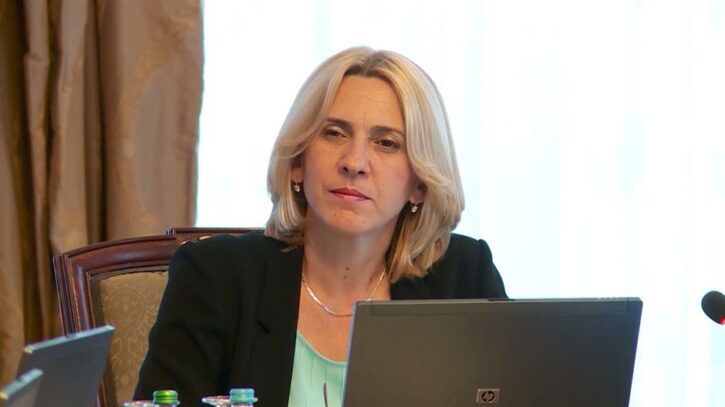
Serbs expressed their outrage and disappointment with Friday’s acquittal of Srebrenica commander Naser Oric who was accused of killing three Bosnian Serb civilians during Bosnia’s 1992-95 war.
Another Oric acquittal means that the Bosnian war crimes court is biased against Serbs and that they cannot expect justice, Serbian and Bosnian Serb leaders concluded.
The President of Republika Srpska (RS), Bosnia’s Serb-dominated territorial entity, said that the acquittal of Oric and his subordinate Sabahudin Muhic is “further proof that the judiciary in Bosnia is working in favour of Bosniak wartime politics.”
“Considering the practice of Bosnia’s Court until now, such a verdict could have been expected and only confirmed our suspicions that this so-called ‘judiciary’ is biased,” said Zeljka Cvijanovic.
The decision will further deepen distrust in the country and negatively impact internal relations which are already strained, according to the RS President.
“With such a decision, all the monstrous crimes committed against the Serb population in Podrinje have practically been forgiven,” she said. “If that kind of justice is meant for the Serb people in Bosnia, then nobody should be surprised that Serbs believe less and less in a joint future within Bosnia.”
“Future generations of Serbs” will call those who are biased “as objective as the Hague Tribunal or the Court of Bosnia and Herzegovina,” said Radovan Kovacevic, the spokesperson of Cvijanovic’s party, the Alliance of Independent Social Democrats (SNSD).
“All of this completely confirms the distrust of Republika Srpska in the unconstitutional judicial institutions of Bosnia. Srpska (RS) will respond to this accordingly,” he said, without elaborating.
The Bosnian Serb member of the country’s Presidency and SNSD party leader, Milorad Dodik, called Oric’s trial a “farce.”
“Bosnia and Herzegovina and institutions such as the Bosnian Court are bad places for Serbs,” he said.
Many things were created in Bosnia to be “against” Serbs, and the country itself represents a “violence against Serbs, which such decisions by the Bosnian Court show.”
He said he would like to see Serbs employed in the Court and Prosecutor’s Office leave the institutions, and that if they do so, they would have his full support.
“I think it is due time to stop this violence and disrespect of Serbs in general,” he said.
Oric and Muhic were accused of killing three Serbs near the villages of Zalazje, Lolici and Kunjorac in 1992.
The two were acquitted in the first-instance ruling but prosecutors appealed and after a retrial, the Appeals Chamber acquitted the two again on Friday.
Reactions also came from the leadership in neighbouring Serbia.
While at a working visit to Cyprus, Serbian President Aleksandar Vucic said that the acquittal is the result of a political decision and that the outcome could have been expected.
“If someone was not sentenced for political reasons, that does not mean he has not committed the crimes. Obviously, there will be no justice for us Serbs,” he said.
Serbia’s Defence Minister Aleksandar Vulin said that the acquittal mocks Serb victims, is an insult to their memory, and a message to Serbs that their lives and deaths are less valued than those of other ethnic groups, Serbian media reported.
Serbia’s Foreign Minister, Ivica Dacic, also complained about the verdict, saying that everybody who was accused of crimes against Serbs ended up as a free person. He said that there were living witnesses to Oric’s war crimes but that the purpose of Friday’s ruling was to worsen Bosnia’s relations with Serbia.
Serbia would like to have good relations with Bosnia, Croatia and Slovenia but that there was “just too much desire to define the Serbs as the only genocidal nation in the world,” he said.
His country has “a million times” condemned all war crimes committed, including the one in Srebrenica, but that others never condemned any crimes against the Serbs.
“Neither Slovenia, nor Croatia or Bosnia have ever said ‘sorry’ or felt responsible for the genocide the Austro-Hungarian Empire committed,” Dacic said, reasoning that those countries were part of that empire and its army when 28 per cent of Serbia’s population was killed between 1914 and 1918.
Oric’s acquittal “comes at a time when the European Parliament, acting on a proposal by a Slovenian MP, adopted an amendment to the Report on Serbia in which Serbia is asked to recognise the genocide in Srebrenica as a condition for joining the European Union,” Dacic said.
There is an overall effort to label Serbia as a country that is to blame for a genocide, although the International Court of Justice ruling said that Serbia is not responsible for the crimes in Srebrenica, he argued.
The Independent State of Croatia (NDH), a wartime fascist puppet state of Germany during WWII, “spread all the way to Belgrade and Novi Sad,” he said, concluding that that “cannot even be compared to Srebrenica.”





